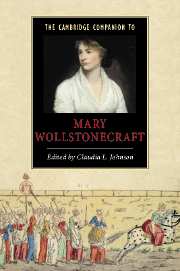Book contents
- Frontmatter
- 1 Introduction
- 2 Mary Wollstonecraft's letters
- 3 Mary Wollstonecraft on education
- 4 Mary Wollstonecraft's Vindications and their political tradition
- 5 Mary Wollstonecraft's French Revolution
- 6 Mary Wollstonecraft's literary reviews
- 7 The religious foundations of Mary Wollstonecraft's feminism
- 8 Mary Wollstonecraft and the literature of advice and instruction
- 9 Mary Wollstonecraft's A Vindication of the Rights of Woman and the women writers of her day
- 10 Mary Wollstonecraft and the poets
- 11 Mary Wollstonecraft's novels
- 12 Letters Written During a Short Residence in Sweden, Norway, and Denmark: traveling with Mary Wollstonecraft
- 13 Mary Wollstonecraft and the sexuality of genius
- 14 Mary Wollstonecraft's reception and legacies
- Select bibliography
- Index
4 - Mary Wollstonecraft's Vindications and their political tradition
Published online by Cambridge University Press: 28 May 2006
- Frontmatter
- 1 Introduction
- 2 Mary Wollstonecraft's letters
- 3 Mary Wollstonecraft on education
- 4 Mary Wollstonecraft's Vindications and their political tradition
- 5 Mary Wollstonecraft's French Revolution
- 6 Mary Wollstonecraft's literary reviews
- 7 The religious foundations of Mary Wollstonecraft's feminism
- 8 Mary Wollstonecraft and the literature of advice and instruction
- 9 Mary Wollstonecraft's A Vindication of the Rights of Woman and the women writers of her day
- 10 Mary Wollstonecraft and the poets
- 11 Mary Wollstonecraft's novels
- 12 Letters Written During a Short Residence in Sweden, Norway, and Denmark: traveling with Mary Wollstonecraft
- 13 Mary Wollstonecraft and the sexuality of genius
- 14 Mary Wollstonecraft's reception and legacies
- Select bibliography
- Index
Summary
The republican milieu
When she set up her school in Newington Green in 1784, Wollstonecraft joined a circle rich in adversarial political experience. As religious Dissenters, they were opposed to the established Church of England. Dissenters could not take the oaths necessary to secure offices under the Crown or even to take degrees at English Universities. Politically they debated the terms of the Whig triumph of 1688 when parliament had seemingly affirmed its paramount power by dismissing James II and calling a Protestant monarch, William of Orange, to the throne. “Real,” or “true,” Whigs complained that Parliament, instead of extending its power and becoming more representative of the people, had used the influence of the throne to establish a monopoly of power in the hands of great landowners. James Burgh, whose widow was Wollstonecraft's personal friend, had compiled a damning dossier on the oligarchy of “borough-mongers,” its manipulation of elections, its system of patronage and nepotism. Republican ideas, from a tradition including Greece, Rome, and Renaissance Italy as well as the seventeenth-century English Commonwealth, were frequently used to attack courtly corruption and democratic arguments were voiced, especially after the American Revolution. Many saw a remedy for corruption in extending parliamentary representation to newly populous towns and widening the franchise to make bribery and intimidation less common. However radical their ideas, few ventured to actually propose dismantling rather than reforming a constitution that purported to balance monarchical, republican, and democratic principles and had brought peace and prosperity to Britain.
- Type
- Chapter
- Information
- The Cambridge Companion to Mary Wollstonecraft , pp. 42 - 58Publisher: Cambridge University PressPrint publication year: 2002
- 3
- Cited by



